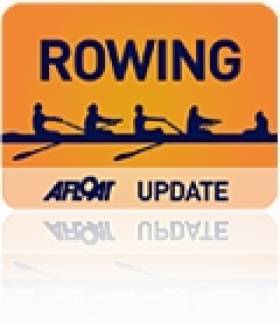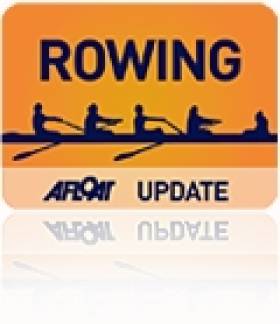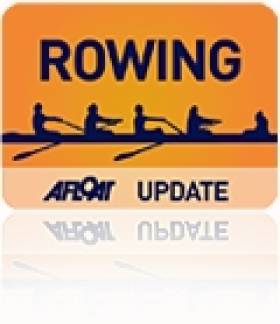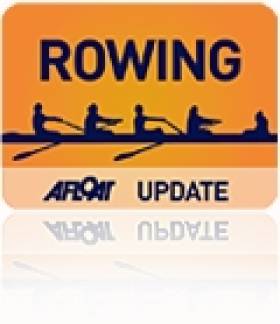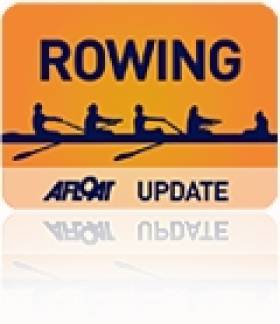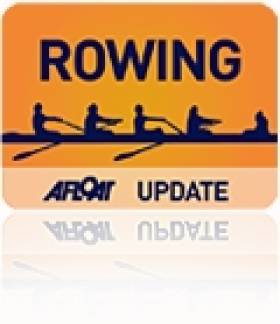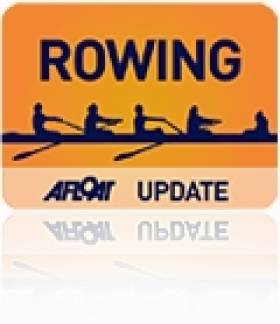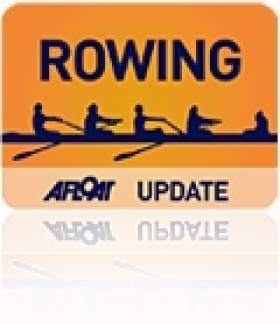Displaying items by tag: rowing
Blind Youngsters Get Going with Rowing
Fourteen visually impaired teenagers from both Rosmini Secondary School and St. Joseph’s Centre for the Visually Impaired took part in a rowing intro afternoon at Dublin Municipal Rowing Centre this week. The aim of the afternoon was to introduce them to indoor rowing as well as rowing on the water and to show the participants as well as their teachers and carers that rowing is an activity that caters for those with visual impairments.The students ranged from being completely without sight to some with partial sight. A number of the group had a visual impairment combined with a learning difficulty. For the group, with the exception of one student from Rosmini, this was their first experience of rowing. Rosmini student Aron O’Dowd, who won a bronze medal at the World Indoor Rowing Championships, is the perfect illustration of this and he spent the afternoon teaching his peers the skills he has learned.
All those who took part in the day thoroughly enjoyed it, and even the four teachers and carers who came along got out on the water for their first time! With the amount of interest from the day I believe there is great potential for Rosmini and St. Joseph’s to develop a link with the sport, whether that be taking up a regular slot at Municipal Rowing Centre or entering teams in the adaptive events at the 2010 Irish Indoor Rowing Championships.
The try it out day also highlighted the use of ErgChatter, a free download from Concept2 which allows the data on the performance monitor (PM3 or PM4) to be spoken aloud through a laptop or PC. It is very simple to use as all it requires is a printer cable that connects performance monitor to one’s laptop or computer. ErgChatter allows the user to choose what data they want to have read out, and at what intervals. It also allows users to set up specific training sessions.
Click this link for Irish Rowing detailsClick this link for the Latest Rowing News
Neptune Braced for Strong Challenge from Big Clubs
Neptune Rowing Club (Dublin) top the new Rowing Ireland Grand League table with two regattas under their oars but this could all change by next Saturday when the third regatta of the six series league takes place at the National Rowing Centre in Cork.
While Dubliners Neptune will be there in force with crews in most grades from under 14 to senior, they will be strongly challenged by the other big clubs, Skibbereen, UCD, Dublin Commercial and St. Michaels from Limerick. In particular, Skibbereen will compete strongly in mainly small boats. (Note: See current league standings below.)
Rowing Ireland spokesperson, Pat McInerney explained, “The overall entry for the regatta is well ahead of previous years which shows that clubs are embracing the new league format and enjoying the enhanced competition structure it offers.”
“From here on this season the top racing group of senior, intermediate and junior A will be collectively known as Division 1 while the novice, junior B and junior 16 group will be known as Division 2. With a massive entry of almost thirty junior 16 men’s single scullers, this is indicative of the health of sculling in the younger ranks and must augur well for the future.”
University of London, who are coached by former Irish lightweight rower, Brian Young, .are sending their men’s squad to challenge for senior eights, fours and pairs. They will line up in the eights against NUIG, Neptune, St Michaels, University of Limerick, Muckross and the top Junior eights of St Josephs and Presentation. This presents a very attractive prospect in store for the famed Leander trophy for eights which was first presented at Cork City regatta in 1904 when the world famous Leander club from London came to challenge for the trophy.
The Grand League offers an overall prize for top club based on all entries and this suits the bigger clubs. Smaller clubs can challenge for individual boat class or one of the four major categories of senior men, women, junior men and junior women
Current Grand League standings:
1 NEPTUNE ROWING CLUB 219
2 COMMERCIAL RC 206
3 SKIBBEREEN RC 192
4 UCD BOAT CLUB 171
5 ST MICHAEL'S ROWING CLUB 150
6 PORTORA BOAT CLUB 117
7 CARRICK-ON-SHANNON ROWING CLUB 102
8 BANN ROWING CLUB 93
9 LEE ROWING CLUB 86
10 GARDA SIOCHANA BOAT CLUB 83
Click this link for Irish Rowing detailsClick this link for the Latest Rowing News
Ten Days 'til Ocean to City Race deadline
There are just ten days remaining for you to get your entry in for the annual Ocean to City race starting in Crosshaven and finishing in Cork City.
The 15-mile race starts at 11.30am at Royal Cork YC on June 12, passing Cobh, Monkstown and Passage West before heading on into Lough Mahon, with the finish at Lapps Quay.
This year's race will feature Atlantic rower Peter Williams and entry is €30 per person, with a €10 entry fee for junior rowers.
More details on the official race website.
Click this link for Irish Rowing detailsClick this link for the Latest Rowing News
Kenny and Ryan Impress at Duisburg
Niall Kenny, from NUIG, and Justin Ryan of UCC finished second to Germany in a very competitive under-23 lightweight double scull final at the Wedau International Regatta in Duisburg. The Irish were the only crew to stay in touch with Clemens Hubler and Matthias Arnold, who made up half of the German lightweight quadruple which took silver at the World Under-23 Championships last year. Italy’s Davide Babboni and Tommaso Sacchini, well back in third place, were the bronze medallists in the lightweight double scull at last year’s Under-23 World Championships.
Wedau International Regatta, Duisburg, Germany, Sunday (Selected Results)
Men, Eight – Final: 1 German Composite 5:47.84; 4 Queen’s 6:10.90.
Pair - Final: 1 Greece (I Tsilis, G Tziallas) 6:51.32; 5 Old Collegians/NUIG (Jacob, Folan) 7:02.49.
Under-23 Lightweight Pair – Heat One: 5 UCD/St Michael’s (English, Hanily) 7:20.75.
Under-23 Lightweight Double Scull – Heat Two: 3 NUIG/UCC (N Kenny, J Ryan) 7:07.11. Final: 1 German Composite (C Hubler, M Arnold) 7:00.83, 2 NUIG/UCC (Kenny, Ryan) 7:02.71, 3 Italy (D Babboni, T Sacchini) 7:09.83, 4 France 7:12.95, 5 Greece 7:16.33, 6 Strathclyde/Durham 7:17.30
Single Scull – Heat One: 3 Queen’s (Williamson) 7:39.69. Final: 1 Greece (I Christou) 7:39.57; 3 Queen’s (Williamson) 7:46.44.
Lightweight Single Scull – Heat One: 6 Commercial (Maher) 7:59.91. Heat Three: 4 Muckross (Moynihan) 7:43.15. B Final: 2 Muckross (Moynihan) 7:47.17.
Women
Quadruple (Straight Final): 1 Austria 7:04.56, 2 St Michael’s/Old Collegians/Carrick-on-Shannon/Tribesmen (Clavin, Jacob, Kelly, McCrohan) 7:06.59.
Single Scull – Heat Two: 2 Old Collegians (Puspure) 8:33.68. A Final: 1 Rostock (M-L Draeger) 8:14.89; 5 Old Collegians (Puspure) 8:31.97.
Lightweight Single Scull – Heat One: 4 Trinity (Dolan) 8:56.14. Heat Three: 4 UCD (Lambe) 8:40.21. B Final: 1 UCD (Lambe) 8:44.28, 2 Trinity (Dolan) 8:45.83.
Click this link for Irish Rowing detailsClick this link for the Latest Rowing News
Three Irish Crews on Mark in Duisburg
Irish crews recorded three third-place finishes on the second day of the Wedau International Regatta in Duisburg in Germany. For the Ireland team, the under-23 lightweight double scull of Niall Kenny and Michael Maher and Sanita Puspure in the women’s single scull were on the mark. The senior eight from Queen’s Unversity continued their good form, conceding only to the Poland and France under-23 squad crews. Poland won the under-23 world championships last year, and three of that crew and the cox were in the crew which finished 2.31 seconds ahead of Queen’s. Eton College, in fourth, were almost five seconds behind the Belfast crew.
Wedau International Regatta, Duisburg, Germany (Day Two, Selected Results)
Men,
Eight – A Final (Men/Women): 1 Polish Composite 6:14.70, 2 France 6:15.11, 3 Queen’s University 6:17.01; 4 Eton College 6:21.91, 5 German Under-23 Composite 6:40.52, 6 France (Women) 7:12.34.
Pair – Heat One: 1 Greece (I Tsilis, G Tziallas) 7:01.98, 2 Old Collegians/NUIG (S Jacob, C Folan) 7:05.81.
Under-23 Lightweight Pair – A Final: 1 France (C Breschet, E Jonville) 7:25.55; 6 UCD/St Michael’s (A English, P Hanily) 7:50.57.
Under-23 Lightweight Double Sculls – Heat Two: 1 Greece (P Magdanis, E Konsolas) 7:11.38, 2 NUIG/Commercial (N Kenny, M Maher) 7:12.57. A Final: 1 Greece 7:12.44, 2 France (A Pilat, C Fonta) 7:15.88, 3 NUIG/Commercial (Kenny, Maher) 7:15.90.
Single Scull – Heat Two: 1 Krakow (W Chabel) 7:36.77, 4 Queen’s University (C Williamson) 7:51.73.
Lightweight Single Scull – Semi-Final One: 1 Neptun eV Konstanz (I Voigt) 7:38.80, 6 Muckross (C Moynihan) 7:54.32. B Final: 1 Muckross (Moynihan) 8:02.18.
Women
Lightweight Double Sculls – Heat One: 1 Austria (M Taupe-Traer, S Borzacchini) 7:54.17, 5 Old Collegians/Tribesmen (S Jacob, S McCrohan) 8:06.92. Heat Two: 1 Zug/Thun (F Albrecht, D Birrer) 8:05.06; 3 Carrick-on-Shannon/St Michael’s (D Kelly, S Clavin) 8:13.38. A Final: 1 Treptower/Potsdamer (D Reimer, S Burmeister) 7:57.24; 5 Carrick/St Michael’s (Kelly, Clavin) 8:12.24. B Final:
Under-23 Lightweight Double Sculls – Heat Two: 1 France (C Mulot, R Jung) 8:2.06, 2 Trinity/UCD (S Dolan, C Lambe) 8:03.17. A Final: 1 Greece 8:08.19; 6 Trinity/UCD (Dolan, Lambe) 8:21.67
Single Sculls – Heat Two: 1 Rostocker (J Lepke) 8:18.78, 3 Old Collegians (S Puspure) 8:22.25. A Final: 1 Koninklijke Belgische (A DeDecker) 8:28.86, 2 Greece (A Tsiavou) 8:31.92, 3 Old Collegians (S Puspure) 8:34.31.
Click this link for Irish Rowing detailsClick this link for the Latest Rowing News
Moynihan and Lightweight Pair Advance
Lightweight single sculler Cathal Moynihan and the the under-23 lightweight pair of Anthony English and Peter Hanily both advanced to today’s round of the Wedau Regatta in Duisburg in Germany yesterday. The men’s pair of Sean Jacob and Cormac Folan could only finish sixth in their heat and must wait until Sunday to compete again.
Wedau Regatta, Duisburg, Day One (Selected Results)
Men, Pair - Heat Three: 6 S Jacob, C Folan 7:06.77.
Under-23 Lightweight Pair – Heat Two: 2 A English, P Hanily 7:26.40.
Lightweight Single Scull: Heat One 3 C Moynihan 7:47.38.
Click this link for Irish Rowing detailsClick this link for the Latest Rowing News
Solo Rower says Atlantic Crossing was 'horrific'
The first Irish man to row solo across the Atlantic Ocean has spoken of his fears that some one will be killed on the challenge which he says was "horrific". After spending 118 days at sea Limerick man Seán McGowan was honoured with a mayoral reception in his native city last night Kathryn Hayes has the full story on the Woodvale Ocean Rowing Race in the Irish Times. Click read more for the story link.
Sean McGowan reached land in Antigua May 1 to become the first Irish-based oarsman to row across an ocean. The 42-year-old from Shannon Rowing Club crossed the Atlantic in 118 days one hour and 14 minutes. He had rowed out of La Gomera in the Canary Islands on January 4th.
Solo rower warns against 'horrific' Atlantic challenge
Click this link for Irish Rowing detailsClick this link for the Latest Rowing News
‘Get Going…Get Rowing’ launches Facebook page
A new initiative to get schoolkids rowing will pit schools against each other online in virtual rowing competitions.
Rowing Ireland’s ‘Get Going, Get Rowing’ initiative is underway and has already brought several schools into contact with the sport. The first phase of the programme gets children rowing on machines and competing online, and hopes to assist them to make the transition onto the water.
Rowing Ireland’s Development Officer, Lisa Hayden explained that they hope to set up a schools league using the online rowpro software, where 16 'boats' can compete online.
She said the experience is 'like a Nintendo Wii, but it's not just giving the illusion of exercise, it's real exercise'.
“The 'Get Going...Get Rowing' initiative is about getting as many young people active as possible through the use of rowing machines, known as ergometers. There are different incentives and lesson plans devised to ensure that it never gets boring. The initiative gives students the opportunity to experience on of Ireland's most successful Olympic sports.
"It is important to the growth of the sport, and getting students, particularly girls, involved at this age is critical if they are to remain active for the rest of their lives.”
The programme will then join with clubs like the Dublin Municipal Rowing Centre, run by Dublin City Council, to transfer rowing enthusiasm into boats on the river.
GET GOING...GET ROWING ON FACEBOOK
Cooney and Morris Lead the Way
Claire Cooney and Ruth Morris of Commercial led the way for Ireland at the KRSG regatta in Ghent, Belgium. They were the fastest junior women’s pair on both Saturday and Sunday. Cork’s Marie O’Neill took gold on Saturday and silver yesterday in the senior single scull. Adrian Sheehan of Castleconnell was an impressive second yesterday in the junior 18 single scull.
KRSG Regatta, Ghent, Belgium (Selected Results)
Saturday
Men, Eight – Junior: 1 France 6:00.0, 2 Abingdon School (Britain) 6:01.50, 3 St Joseph’s 6:18.15.
Four – Junior: 4 St Joseph’s 6:44.60. Junior, coxed: 2 St Joseph’s 7:17.53.
Sculling, Single – Junior: 6 Castleconnell (A Sheehan) 7:44.76.
Women, Eight – Junior: 1 France 6:51.88, 2 Methody, Belfast 7:26.56.
Four – Senior: 3 Commercial 7:24.72. Junior: 2 Commercial 7:42.93, 3 Cork 7:54.81.
Pair – Junior: 1 Commercial (C Cooney, R Morris) 8:22.56.
Sculling, Single – Senior: 1 Cork (M O’Neill) 8:08.79,
Sunday
Men,
Eight – Junior 18: 3 St Joseph’s 6:24.28. Junior 16: 2 St Joseph’s 6:53.78.
Four – Junior: 5 St Joseph’s 7:06.88. Four, coxed: 1 France 6:42.94, 2 St Joseph’s 7:17.53.
Sculling, Double – Junior: 4 Castleconnell (A Sheehan, E O’Connor) 7:15.91.
Single – Junior 18: 1 France 7:38.22, 2 Castleconnell (Sheehan) 7:39.02
Women
Eight – Junior: 1 France 7:01.75, 2 Commercial 7:39.81, 3 Methody 7:44.56.
Four – Junior: 3 Commercial 7:45.53.
Pair – Junior: 1 Commercial (Cooney, Morris) 8:29.38; 4 Cork (Fehily, L Murphy) 8:40.04.
Sculling, Double – Senior: 3 Offaly (J Moran, E Moran) 7:46.03. Junior 18: 6 Cork (G Collins, N Fehilly) 8:18.44
Single – Senior: 2 Cork (M O’Neill) 8:24.44.
Click this link for Irish Rowing detailsClick this link for the Latest Rowing News
McGowan First Irish-based Oarsman to Row Ocean
Sean McGowan reached land in Antigua yesterday to become the first Irish-based oarsman to row across an ocean. The 42-year-old from Shannon Rowing Club crossed the Atlantic in 118 days one hour and 14 minutes. He had rowed out of La Gomera in the Canary Islands on January 4th.
Click this link for Irish Rowing detailsClick this link for the Latest Rowing News


























